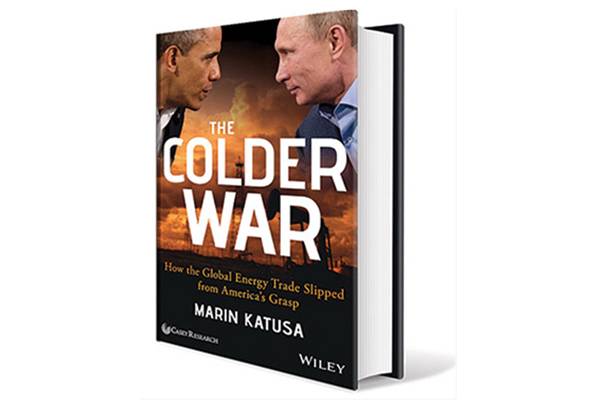
The Colder War: How the Global Energy Trade Slipped from America’s Grasp
Marin Katusa
Wiley (paperback), 2014
PRs 995
How the massive power shift in Russia threatens the political dominance of the United States. There is a new cold war underway, driven by a massive geopolitical power shift to Russia that went almost unnoticed across the globe.
n The Colder War: How the Global Energy Trade Slipped from America’s Grasp, energy expert Marin Katusa takes a look at the ways the western world is losing control of the energy market, and what can be done about it.
Russia is in the midst of a rapid economic and geopolitical renaissance under the rule of Vladimir Putin, a tenacious KGB officer turned modern-day tsar. Understanding his rise to power provides the keys to understanding the shift in the energy trade from Saudi Arabia to Russia. This powerful new position threatens to unravel the political dominance of the United States once and for all.
- Discover how political coups, hostile takeovers, and assassinations have brought Russia to the center of the world’s energy market
- Follow Putin’s rise to power and how it has led to an upsetting of the global balance of trade
- Learn how Russia toppled a generation of robber barons and positioned itself as the most powerful force in the energy market
- Study Putin’s long-range plans and their potential impact on the United States and the U.S. dollar
The Colder War takes a hard look at what is to come in a new global energy market that is certain to cause unprecedented impact on the U.S. dollar and the American way of life.
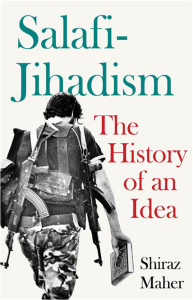
Salafi-Jihadism: The History of an Idea
Shiraz Maher
Hurst (hardcover), 2016
PRs 4400
No topic has captured the public imagination of late quite so dramatically as the spectre of global jihadism. While much has been said about the way jihadists behave, their ideology remains poorly understood. As the Levant has imploded and millenarian radicals claim to have revived a Caliphate based on the teachings of the Prophet Mohammed (PBUH), the need for a nuanced and accurate understanding of jihadist beliefs has never been greater.
Shiraz Maher charts the intellectual underpinnings of salafi-jihadism from its origins in the mountains of the Hindu Kush to the jihadist insurgencies of the 1990s and the 9/11 wars. What emerges is the story of a pragmatic but resilient warrior doctrine that often struggles - as so many utopian ideologies do - to consolidate the idealism of theory with the reality of practice.
His ground-breaking introduction to salafi-jihadism recalibrates our understanding of the ideas underpinning one of the most destructive political philosophies of our time by assessing classical works from Islamic antiquity alongside those of contemporary ideologues. Packed with refreshing and provocative insights, Maher explains how war and insecurity engendered one of the most significant socio-religious movements of the modern era.
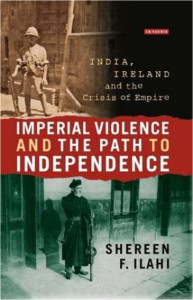
Imperial Violence and the Path to Independence
Shereen Ilahi
IB Tauris (hardcover), 2016
PRs 11258
In the aftermath of World War I, the British Empire was hit by two different crises on opposite sides of the world?the Jallianwala Bagh, or Amritsar, Massacre in the Punjab and the Croke Park Massacre, the first ‘Bloody Sunday’, in Ireland. This book provides a study at the cutting edge of British imperial historiography, concentrating on British imperial violence and the concept of collective punishment. This was the ‘crisis of empire’ following the political and ideological watershed of World War I. The British Empire had reached its greatest geographical extent, appeared powerful, liberal, humane and broadly sympathetic to gradual progress to responsible self-government. Yet the empire was faced with existential threats to its survival with demands for decolonisation, especially in India and Ireland, growing anti-imperialism at home, virtual bankruptcy and domestic social and economic unrest. Providing an original and closely-researched analysis of imperial violence in the aftermath of World War I, this book will be essential reading for historians of empire, South Asia and Ireland.
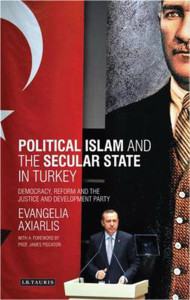
Political Islam and the Secular State in Turkey
Evangelia Axiarlis
IB Tauris (hardcover), 2014
PRs 13200
How safe is Turkey’s liberal democracy? The rise to power in 2002 of the right-leaning Islamic Justice and Development Party ignited fears in the West that Turkey could no longer be relied upon to provide a buffer against the growth of Islamic fundamentalism in the Middle East. But the contribution of the JDP (or AKP as it known in Turkey) to civil liberties and basic freedoms, long suppressed by secular and statist Kemalist ideology, has remained unexamined despite more than a decade in government. In this – the first detailed study of the policies and ideology of Prime Minister Erdogan’s government – Evangelia Axiarlis examines the extent to which the JDP has worked to improve civil life in Turkey and critically addresses whether a government built on Islamic principles can champion political reform. Exploring how Islam and democracy are neither monoliths nor mutually exclusive, this is a timely contribution to the wider understanding of political Islam.
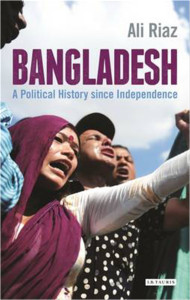
Bangladesh: A Political History since Independence
Ali Riaz
IB Tauris (hardcover), 2016
PRs 12130
Bangladesh is a country of paradoxes. The eighth most populous country of the world, it has attracted considerable attention from the international media and western policy-makers in recent years, often for the wrong reasons: corruption, natural disasters caused by its precarious geographical location, and volatile political situations with several military coups, following its independence from Pakistan in 1971. Institutional corruption, growing religious intolerance and Islamist militancy have reflected the weakness of the state and undermined its capacity. Yet the country has demonstrated significant economic potential and has achieved successes in areas such as female education, population control and reductions in child mortality. Ali Riaz here examines the political processes which engendered these paradoxical tendencies, taking into account the problems of democratization and the effects this has had, and will continue to have, in the wider South Asian region. This comprehensive and unique overview of political and historical developments in Bangladesh since 1971 will provide essential reading for observers of Bangladesh and South Asia.

